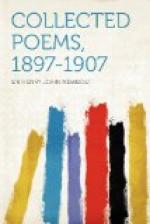He saw the dark wainscot and timbered roof,
The long tables, and the faces merry and
keen;
The College Eight and their trainer dining aloof,
The Dons on the dais serene.
He watched the liner’s stem ploughing the foam,
He felt her trembling speed and the thrash
of her screw;
He heard the passengers’ voices talking of home,
He saw the flag she flew.
And now it was dawn. He rose strong on his feet,
And strode to his ruined camp below the
wood;
He drank the breath of the morning cool and sweet:
His murderers round him stood.
Light on the Laspur hills was broadening fast,
The blood-red snow-peaks chilled to dazzling
white:
He turned, and saw the golden circle at last,
Cut by the Eastern height.
“O glorious Life, Who dwellest in earth and
sun,
I have lived, I praise and adore Thee.”
A
sword swept.
Over the pass the voices one by one
Faded, and the hill slept.
Ionicus
With failing feet and shoulders bowed
Beneath the weight of happier days,
He lagged among the heedless crowd,
Or crept along suburban ways.
But still through all his heart was young,
His mood a joy that nought could mar,
A courage, a pride, a rapture, sprung
Of the strength and splendour of England’s
war.
From ill-requited toil he turned
To ride with Picton and with Pack,
Among his grammars inly burned
To storm the Afghan mountain-track.
When midnight chimed, before Quebec
He watched with Wolfe till the morning
star;
At noon he saw from Victory’s deck
The sweep and splendour of England’s
war.
Beyond the book his teaching sped,
He left on whom he taught the trace
Of kinship with the deathless dead,
And faith in all the Island Race.
He passed: his life a tangle seemed,
His age from fame and power was far;
But his heart was night to the end, and dreamed
Of the sound and splendour of England’s
war.
The Non-Combatant
Among a race high-handed, strong of heart,
Sea-rovers, conquerors, builders in the waste,
He had his birth; a nature too complete,
Eager and doubtful, no man’s soldier sworn
And no man’s chosen captain; born to fail,
A name without an echo: yet he too
Within the cloister of his narrow days
Fulfilled the ancestral rites, and kept alive
The eternal fire; it may be, not in vain;
For out of those who dropped a downward glance
Upon the weakling huddled at his prayers,
Perchance some looked beyond him, and then first
Beheld the glory, and what shrine it filled,
And to what Spirit sacred: or perchance
Some heard him chanting, though but to himself,
The old heroic names: and went their way:
And hummed his music on the march to death.




